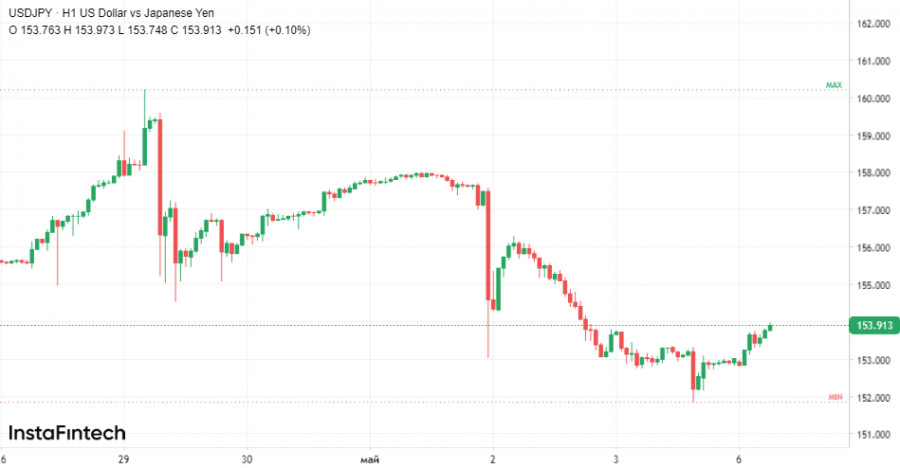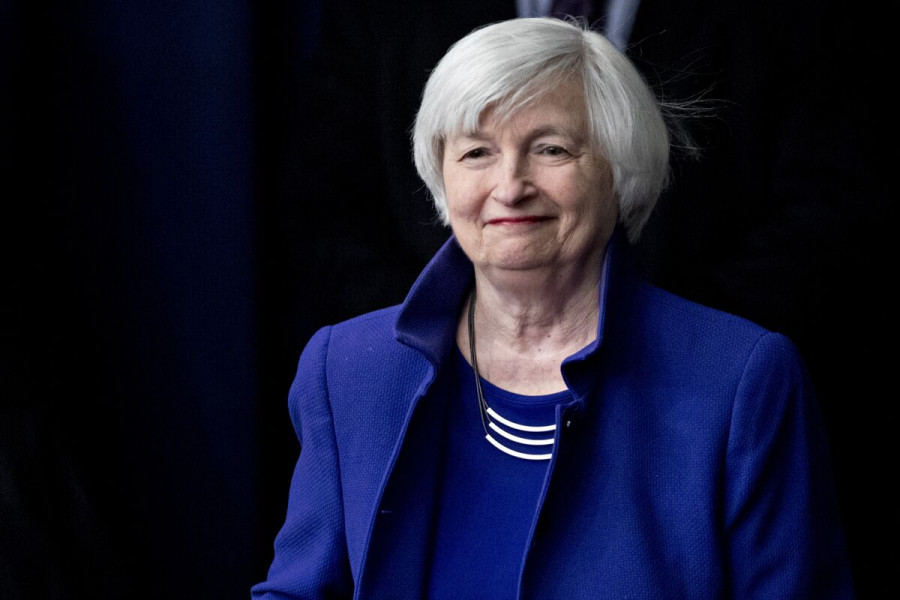Last week, the USD/JPY pair experienced its strongest drop since November 2022, falling by more than 4%. Many traders suppose that the Japanese government, which has twice entered the market to support its currency, was involved in the sharp decline of the dollar against the yen. They do not rule out that the authorities will soon repeat the scenario of 2022 when they conducted three consecutive currency interventions.
Why did the yen surge?
Last week, the Japanese currency showed three jumps against its American counterpart, two of which were probably caused by Tokyo's interventions.
The first sharp strengthening of the yen occurred on Monday, April 29, after the JPY tumbled against the dollar to a new 34-year low of 160.245 due to a more dovish than anticipated Bank of Japan meeting rhetoric.
At its April meeting, the BOJ kept rates in their current range, which was set in March, and made it clear that it was not going to raise the rate anytime soon as it was not confident in inflation stability.
For the second time, the yen rose rapidly against the dollar on Wednesday, May 1, a couple of hours after the conclusion of the Federal Reserve's meeting. At that meeting, the regulator also kept interest rates unchanged and reiterated its intention to keep them high until inflation starts to fall steadily.
The prospect that the huge gap between US and Japanese rates will persist for a long time allowed the dollar to keep from falling against the yen. However, the greenback dropped after Fed Chair Jerome Powell said that a rate hike was unlikely to be the central bank's next move.
The striking resilience of the USD/JPY pair is thought to have forced Tokyo to conduct a second intervention to support the yen. Curiously, the Japanese government refused to comment on the fact that it was involved in the sharp rise in the JPY on both occasions.
Nevertheless, Bloomberg analysts said the other day that Japanese authorities spent more than 9 trillion yen last week to support their weakening currency.
The third wave of yen strengthening occurred on Friday, May 3. This was a natural rise in the Japanese currency caused by fundamental factors, namely, weak statistical data on the US labor market.
The Nonfarm Payrolls report published at the end of the week unveiled that last month American employers created 175 thousand jobs, which is the smallest increase in six months. The reading was below the expectations of a rise of 243 thousand.
At the same time, payrolls advanced by 3.9% at an annualized rate, which is also below the 4.0% forecast and down from March's 4.1% growth. Meanwhile, the unemployment rate climbed to 3.9% from 3.8% in April.
Signs of a cooling US labor market have intensified traders' views of an earlier US rate cut. Now, investors assume that the regulator will start cutting the benchmark rate in September instead of November.
Also, after the employment report, traders increased the probability that the Fed would impose two rounds of monetary policy easing this year. They now expect the regulator to lower rates by about 47 bps by the end of the year, compared to the projected 42 bps before the nonfarm payrolls were published.
Strengthening dovish sentiment among traders around the Fed's future policy has put heavy pressure on the dollar. On Friday, the US dollar index tested a 3-month low of 104.52, while against the yen it weakened by more than 1% to the lowest level of 151.86 last seen on April 10.
The yen may need another bailout
On Monday, the USD/JPY pair stopped its multi-day decline, starting a rapid rise. Thus, at the time of the publication, the major jumped by almost 0.5% to the level of 153.98 from Friday's close.
The comments of US Treasury Secretary Janet Yellen on the alleged Japanese interventions last week were the main driver for the asset.
The official noted that the Japanese currency had strengthened sharply. However, she did not comment on whether Japan had intervened to support the yen.
"I'm not going to comment on whether they did or didn't intervene," Yellen told reporters on Saturday, stressing that interventions should be aimed only at reducing market volatility, not at manipulating exchange rates.
The fact that the US government has not confirmed the intervention has encouraged dollar bulls. However, this could not be a very good idea given today's low liquidity.
On Monday, markets in Japan are closed due to Children's Day celebrations, which is likely to result in lower trading volumes. Since Japanese authorities chose calm periods last week to intervene, traders should now be on high alert throughout the day.
Valentin Marinov, an analyst at Credit Agricole, said that Tokyo might lower USD/JPY once again. He supposes that they may enter the market again in the very near future to maximize the effect of their previous interventions, taking advantage of the reduced liquidity during the holidays.
The same viewpoint is supported by his colleagues at Goldman Sachs. They also see a high risk of Tokyo's repeated intervention this week, as the macroeconomic situation as a whole remains quite negative for the yen.
"But, buying time is still valuable, as it reduces the potential for economic disruptions from the exchange rate adjustment and could stabilize the currency until the economic backdrop becomes more supportive for JPY," experts said.
Meanwhile, the weekly report of the Commodity Futures Trading Commission showed that last week, traders abandoned record bets on the yen's drop.
Leveraged funds and asset managers now have about 168,388 contracts tied to bets on the yen falling in the coming weeks.
"Traders edged back from record bets on yen weakness this past week, in a period that included a likely bout of intervention by the Japanese," Bloomberg analysts said.
Speculative traders have been opening short positions on the Japanese currency since early 2023. That means that some down bets may be more sustainable than those made in recent weeks, when the yen's fall against the dollar accelerated.
For this reason, many analysts, including Rabobank's Jane Foley, are confident that Japan's Finance Ministry will not limit itself to just two interventions and will continue to stabilize its currency as needed.
She thinks that Tokyo will have to lower the dollar/yen exchange rate more than once to really undermine the resolve of many speculators.
























